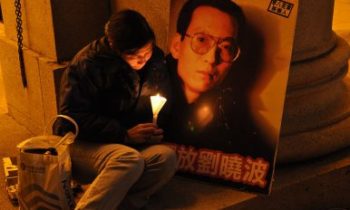 The Norwegian Nobel Committee condemned the Chinese authorities in a rare statement.
The Norwegian Nobel Committee condemned the Chinese authorities in a rare statement.
Liu Xiaobo, the first and so far the only Chinese citizen who has won the Nobel Peace Prize, has been released from Chinese prison on medical parole with liver cancer diagnosis. The news has been widely transmitted around the world, yet in mainland China, only a few Chinese people were able to get access to the information through the Great Firewall.
On June 26, Liaoning Provincial Prison Administration released a brief statement about Liu’s release:
Liu Xiaobo, the prisoner of Jinzhou prison in Liaoning Province, was diagnosed with liver cancer. Recently, the Liaoning Provincial Prison Administration lawfully approved Liu’s medical parole. The First Hospital of China Medical University has formed a medical treatment group composed by eight well-known domestic cancer experts to treat Liu. Liu Xiaobo is receiving medical treatment accordingly.
Soon, Liu’s lawyer Shang Baojun verified the news to multiple media and acknowledged that Liu’s liver cancer is already in the late stage. A Hong Kong online magazine, Duan, posted a short video of Liu’s wife, Liu Xia, who cried and talked about her husband’s condition in a staccato sentence: “[They] cannot perform surgery, or radiotherapy, or chemotherapy.”
Liu Xiaobo, 61, a famous writer and commentator on Chinese politics, was sentenced to 11 years in Chinese prison in late 2009 for “subversion of state power.” He won the Nobel Peace Prize in 2010. Liu’s good friend Mo Zhixu told the Hong Kong magazine that in the prison, “Liu lived an isolated life. He had a piece of land to grow vegetables or to run around. But he was completely isolated from the outside world or other people.” In the eight years Liu was in prison, Mo added, “no book could be sent to him … for an intellectual, a life that is completely isolated from information is a harsh torture.”
Facing Liu’s current situation, the Norwegian Nobel Committee released a rare statement on June 26, condemning the Chinese authorities with unusually strong words. It said:
…the Committee strongly regrets that it took serious illness before Chinese authorities were willing to release him from jail. Liu Xiaobo has fought a relentless struggle in favor of democracy and human rights in China and has already paid a heavy price for his involvement. He was, essentially, convicted for exercising his freedom of speech and should never have been sentenced to jail in the first place. Chinese authorities carry a heavy responsibility if Liu Xiaobo, because of his imprisonment, has been denied necessary medical treatment. The Committee hopes that he will now be released without conditions and offered the best possible treatment for his illness, whether it be in China or abroad.
However, no single piece of information about Liu’s release or his health has been officially published in mainland China. Any information posted to Chinese social media, such as Weibo and WeChat, has been thoroughly and instantly deleted by Chinese censors.
Chinese censors not only deleted information related to Liu in social media, but also struck out relevant information in official transcripts. According to BBC Chinese, at a regular press briefing on June 26, a journalist asked Geng Shuang, a Chinese Foreign Ministry spokesperson, about Liu, but Geng said he knew nothing about it. Yet the brief dialogue was not recorded in the official transcript.
In an interview conducted by AFP, US embassy spokeswoman Mary Beth Polley said: “We call on the Chinese authorities to not only release Mr. Liu but also to allow his wife Ms. Liu Xia out of house arrest.”
On June 27, a journalist again asked the Chinese Foreign Ministry about Liu and China’s reply to the U.S. criticism at the regular press briefing.
According to the BBC, spokesperson Lu Kang replied: “China is a country with rule of law. Everyone is equal before the law. All other countries should respect China’s judicial independence and sovereignty and should not use any so-called individual case to interfere in China’s internal affairs.”
Not surprisingly, Lu’s reply was not recorded in the official transcript either.
Regardless of the harsh censorship, some Chinese netizens still tried their best to transmit the information on social media with their own cipher codes. Other talked vaguely about the importance of “conscience.”
Ironically, the word conscience in Chinese is “liangzhi,” which literally means “good knowledge.”Perhaps the Chinese ancestors who coined the word already knew that “good knowledge” is the precondition for an accurate conscience, and the best way to tar people’s conscience is to block information.
(the diplomat)
